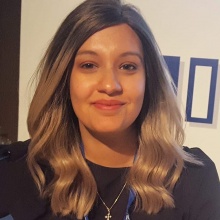We see women handling weapons in military recruitment ads, on TV and in blockbuster movies, but often with overly feminized and sexualized overtones. In reality, the number of women doing jobs related to weapons and ammunition management (WAM) are small. WAM, which is defined as the oversight, accountability and management of arms and ammunition throughout their lifecycle, is still seen as a man’s job.
But women can – and do – contribute to WAM just as well as men. Additionally, gender diversity, and diversity more broadly, are key to cultivating ideas and perspectives that ensure WAM policies and practices adequately respond to the different needs of all groups affected by the proliferation of arms and ammunition. For some activities, such as demining, diverse teams are proven to be more effective than single gender teams.
In recent years, we’ve seen a broadening of the field of WAM, which is no longer a realm reserved for national militaries and security forces, but involves a plethora of organizations that are supporting national actors by providing technical expertise and capacity building. As a result, there is a small but growing number of women working in WAM technical roles.
How can we better understand the opportunities and challenges to increase diversity in this field and make it more gender-responsive? UNIDIR has interviewed over 35 WAM specialists and gathered their views and perspectives on the relevance of gender perspectives and diversity in WAM. Here are some of our preliminary findings.
Working in WAM, Saving Lives
The work of weapons and ammunition storage keepers and managers, ammunition technical officers and explosive ordinance disposal (EOD) specialists, involves a very high level of responsibility and accountability. Storage keepers and managers, for example, are held personally accountable for any weapons or materiel that is not properly secured or stored. For ammunition technicians or EOD specialists, the job of safely disposing explosives – including by detonation – requires tremendous concentration under a great deal of pressure, where one mistake can be deadly.
When asked why she would pursue such risky and dangerous work, Afifa Habbasi an EOD Level III specialist, originally trained in the Tunisian Military, said “Why not? Women are increasingly participating in all sectors of society at all levels including in the military, police and as decision makers in government, so why wouldn’t women also be involved in weapons and ammunition management?”. Afifa’s motivation goes beyond proving that women can do the same jobs as men, “I wanted to pursue a career in ammunition engineering because I wanted to work in the humanitarian field and help save lives.
In fact, WAM has been recognized as a means to reduce armed violence and save lives by curbing the proliferation of weapons and ammunition, whose impact is gendered and affects women and girls, men and boys in different ways. WAM also helps prevent unplanned explosions at munition sites, a phenomenon which can have reverberating and devastating impacts on entire communities. Women working in this field are helping to overcome the limited articulation of women as victims and demonstrating the multiple roles that women can play in international security.
Challenging Harmful Stereotypes and Rigid Institutions
WAM professionals often work in remote military bases, spending significant time away from family and friends. To complicate matters, these postings may lack appropriate working conditions and adequate infrastructure for women, such as separate toilets, showers and dormitories.
Overcoming gender stereotypes, however, is frequently a much bigger hurdle than the working conditions. Women are often made to feel like they don’t belong in this field and have their abilities questioned. In our interviews, they shared experiences of being the only woman in the team and added that they struggled to gain acceptance from their colleagues, especially at the beginning of their careers.
Lina Maria Castillo Mendez, a trained EOD specialist from Colombia is no stranger to this, “I’ve been in meetings where the gentleman in front of me has just decided to say, ‘I’m not meeting with you. I’ll talk to your boss, who is a man.'”
When joining the British military, Fiona Kilpatrick wanted to specialize as an ammunition technician, but she was told by a male military recruiter that “this is a male dominated job and it is too difficult for you.” This only strengthened her resolve and she eventually left the military to join The HALO Trust, an international NGO known for humanitarian demining and WAM. She’s deployed to Cote d’Ivoire, Laos and Sri Lanka, and now heads HALO’s training department preparing more and more women for these technical roles.
Many women we interviewed suggested that more opportunities were available to them abroad than in their own countries. Afifa Habbasi, left her national military to pursue an international career. “I chose an international career because […] back home, you cannot progress so fast. Especially for a woman, your hard work in this challenging area is not really considered by male colleagues.”
Tamara Svircev, a specialist in physical security and stockpile management, has collaborated with military and police officers in the Western Balkans. She’s witnessed “hard-working women that are experts in this area leave their position because they cannot maintain their work-life balance. Because, unfortunately in some working environments and institutions, the mechanisms to retain them and enable their full professional advancement are still not fully implemented. Including flexible arrangements, which would facilitate work-life balance.”
The Road Ahead
So, how can we ensure that women have equal opportunities to pursue a career in WAM?
First, we must make professional women working in WAM more visible, as opposed to those seen in movies and TV shows. Promoting role models in this field is an important way to change perceptions about women in these roles.
Second, we should promote a comprehensive understanding of WAM, which goes beyond the so-called “hard” measures, such as stockpile management. Reframing the field to demonstrate its impact on conflict prevention, protection of civilians and social-economic development will attract more diverse candidates from non-military backgrounds.
Third, it’s crucial to review recruitment policies and working conditions, to ensure that women and men have equal conditions for professional development in the field. This can be done through inclusive recruitment practices that open military career pathways for women and provide job training opportunities. This recruitment effort should be accompanied by adequate physical infrastructure for women in military bases and a work environment free from discrimination and sexual harassment. Equally important are practices that accommodate family life by recognizing that both women and men have family caregiving responsibilities.
Creating a level playing field is not only the right thing to do, but also the smart one, as more diversity in WAM will strengthen its effectiveness and more employment opportunities for women in this area will positively impact their own lives and the quality of life in their communities. As UN Secretary-General António Guterres said, “the world has an opportunity to leave behind generations of entrenched and systemic discrimination.” Our work reveals the social, economic and security benefits of challenging harmful gender norms, transforming perceptions and changing discriminatory policies affecting women in WAM. It’s time to build an equal future, in which women can realize their full potential and play a transformative role in changing gender stereotypes in WAM and in the broader security field.
Hana Salama is a Researcher in the Gender and Disarmament programme. Her areas of expertise include gender analysis, civilian casualty recording, protection of civilians in conflict, small arms control and disarmament.
This piece presents findings from a larger research project. The author is grateful to colleagues from UNIDIR’s Gender and Disarmament Programme, as well as the Conventional Arms Programme, for their contribution and insights.

